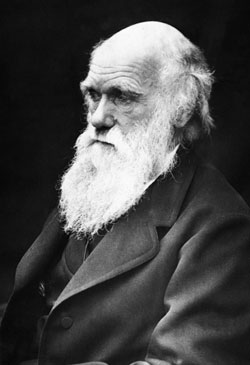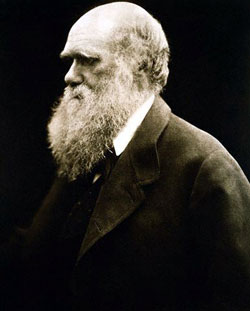Marx and Darwin: Two great revolutionary thinkers of the nineteenth century (Pt.2)
Part 2 (From our archives)
THE WAR OF IDEAS NEVER RESTS BECAUSE IDEAS HAVE CONSEQUENCES.
By Chris Talbot – wsws.org
This is the second of a three-part series comprising a lecture by WSWS correspondent Chris Talbot to meetings of the International Students for Social Equality in Britain. Part 1 was posted on June 17 and Part 3 on June 19.
There is a wealthy and powerful movement of the Christian right in the United States that has, and still is, attempting to stop Charles Darwin’s theory of evolution being taught in schools as the basis of all biological science. It has done this by putting forward a completely unscientific defence of religious obscurantism, generally based on literal interpretations of the Bible. At first this was known as creationism. By the 1980s as many as 27 states in the US had proposed legislation that, whilst it couldn’t oppose Darwin being taught, demanded that so-called creation science was taught as well. Creationism was obviously religious. It proposed creation of the universe a few thousand years ago, a big flood, etc., so in 1987 its teaching was ruled to be illegal by the Supreme Court. As a result of the American Revolution, there is a separation of church and state and religion cannot be taught in schools, as it is in Britain.
The religious right in America found a way round this ban. They rewrote their material, avoiding any explicit religious references and simply replaced the word creationism with the phrase “Intelligent Design.” In this they received the backing of the Bush administration, which saw the Christian right as a key constituency.
In 2005 there was a famous federal court case, Kitzmiller v. Dover Area School District. Right-wing fundamentalists had taken over a school board in Pennsylvania and attempted to put Intelligent Design on the syllabus along with Darwinian biology. In the course of this case it was established beyond all doubt that Darwin’s theory of natural selection has been fully vindicated, is scientifically proven and is the basis for all biology. Moreover, the continuity between creationism and Intelligent Design was established as it was shown that the original Creationist text, Of Pandas and People, had been merely modified and that references to creationism had been replaced by “Intelligent Design.”
But demands for Intelligent Design to be taught in US schools or introduced into academia did not end. There is a lot of financial backing for reactionary religious ideology. We reported in 2005 on the World Socialist Web Site that the Smithsonian Institution’s National Museum of Natural History in Washington DC, which is state-funded and the most prestigious natural history museum in the US, agreed to the showing of a documentary on Intelligent Design put out by the main body funding this attack on Darwin, the Discovery Institute based in Seattle. [8] January’s edition of Scientific American, which is devoted to evolution, discusses the work of the Discovery Institute and the campaign to demand “academic freedom,” portraying teachers who take up their agenda as unfairly victimised. They insist on being able to “teach the controversy” and to use “critical analysis” regarding evolution, as though Intelligent Design can be put on a par with Darwinism.
There are many influential voices in Britain who would like to promote the same strategy, and I’m not just referring to Biblical literalists. Writing recently in the Spectator, journalist Melanie Phillips attacked one of the scientists who played a key role in the Dover trial, Professor Ken Miller.[9] Miller explained how the religious right had repackaged creationism as Intelligent Design. “The court was simply wrong,” writes Phillips, “doubtless because it had heard muddled testimony from the likes of Prof Miller.”
Instead she demands that we accept the claims of the Discovery Institute, or, as she states: “Creationism comes out of religion while Intelligent Design comes out of science.”
Tony Blair and the Labour government recognized there were potential supporters on the Christian right, following, as in every aspect of politics, the Bush regime. They pioneered faith-based schools and allowed state schools to attract private cash by becoming academies. The Emmanuel Schools Foundation controls four of these academies in the North East of England. They are state schools, but they are effectively run by a Christian fundamentalist, Sir Peter Vardy, who made his money through the Reg Vardy Group of car dealers. The Foundation claims it no longer teaches creationism, but it certainly did do so for several years, as the British Centre for Science Education revealed.[10] It is only as a result of campaigns by such bodies, and because of lobbying from scientists, that the Labour government, after 10 years in office, eventually put out a statement in 2007 stating that “creationism and intelligent design are not part of the science National Curriculum programmes of study and should not be taught as science.” It can still presumably be taught in other subject areas. I am sure that if Blair had got his way we would have Intelligent Design taught in schools everywhere.
Evidence for evolution
Perhaps I can digress slightly here by referring briefly to the wealth of material—some of it presented in the Dover case, some of it very recent—that confirms Darwin’s theory. This has been called the golden age of biological science, compared to the golden age of physical science in the early 20th century and I think that assessment is correct.
One can certainly recommend as a starting point the recent BBC documentary by David Attenborough, “Charles Darwin and the Tree of Life,” in which he tackles the standard arguments against evolution in a clear and informative manner.[11] One of the issues raised by the Christian fundamentalists is the question of how the eye evolved. Nobody has ever seen a creature with half an eye, they say. Attenborough shows creatures with eyes or proto-eyes in various stages of development and refutes that objection to Darwinism.
Another common argument against evolution is the supposed gap in the fossil record between the Pre-Cambrian and Cambrian period. The fossil record shows what is often referred to as the Cambrian explosion of diverse species. Creationists claimed that some nonmaterial intervention is necessary to explain this phenomenon. But there is now an increasing body of fossil evidence from the Pre-Cambrian period. Attenborough shows some fossils from Charnwood near Leicester, 560 million years old, some of the oldest in the world, from well before the Cambrian period.
There does appear to be a considerable increase in the number of species dating from the Cambrian, found, for example, in the Burgess Shale formation in Canada, and involving some very strange looking creatures. When the famous paleontologist Stephen Jay Gould suggested that our conventional idea of evolution would need to be modified to explain this phenomenon, the Intelligent Design people seized on his remarks. However, one of the main experts on the Burgess Shale, Simon Conway Morris of Cambridge University, has demonstrated that the Cambrian “explosion” can be explained by conventional Darwinian theory.[12]
This is just one example of the way in which scientific understanding of evolution has increased in the last few years. By comparing the DNA of many creatures, a vast mine of information has been built up that helps explain much more about evolution, giving a new kind of “fossil” record in the genes themselves. It is even possible to construct a “tree of life,” based on the hundreds of genomes that are now available, as well as the human genome.[13]
We have come to understand that the genes controlling the making of an insect’s body and organs are the same as the genes that control the making of our bodies. It is how these genes are used that determines the vast range of creatures stemming from the Cambrian. Sean B. Carroll, an expert in what is called “evo-devo,” has written popular books on this area of study. [14]
We should also briefly mention the important work done on bacteria, such asE.coli.[15] They make up 1 percent of the bacteria inside us, some million million (one and twelve zeros). Professor Richard Lenski and his team at Michigan State University have been studying evolution in the laboratory by investigating how E.coli breed under different conditions. They have found 100 beneficial mutations in 40,000 generations of bacteria, showing evolution actually at work. Scientists have also unravelled the metabolic pathway inE.coli, involving 1,260 genes and 2,077 chemical reactions, allowing them to construct computer models of these creatures.
Establishment religion
After considering the issue of Intelligent Design, right-wing opponents of Darwinian science and its teaching in schools, let us consider the position of the established Christian churches. They claim to be supporters of Darwinian evolution. Provided it is recognized that natural science applies only to the material world, they claim they can happily coexist with and even encourage Darwin’s theory. For the Church of England this was the position it had largely adopted by the time Darwin’s Origin was published. God had set the natural world in motion in biology, just as he had done before in Newtonian physics. However, the spiritual world, the world of morality and human consciousness, was the legitimate domain of the Church.
It would seem that science could happily coexist with this religious position in a sort of division of labour. I think this view is profoundly mistaken. It is not just religion as a private matter that is involved here. In the case of individual belief, we stand for freedom of opinion and are opposed to all forms of religious oppression. But what is involved here is the ideology of the religious establishment, an integral part of the ruling elite. Unlike the US we have in Britain a state-funded church, unelected Bishops in the House of Lords, and daily religious services are compulsory in schools. We also have church-run schools of many denominations.
The religious establishment’s claim to support science is misleading. The Theos think-tank,[16] backed and well funded by the Church of England and the Catholic Church, recently commissioned an opinion poll asking the question: Do you agree with the statement: “Evolution alone is not enough to explain the complex structures of some living things, so the intervention of a designer is needed at key stages”? Fifty-one percent of those questioned agreed with the statement, while 32 percent agreed that “God created the world sometime in the last 10,000 years.”
The cause for this level of ignorance is not hard to find. Science is taught in schools according to the Labour government’s National Curriculum and has suffered a longstanding decline. Evolution is not taught in schools at all, apart from the small numbers who specialize in biology. The science syllabus for Key Stage 4, which is taught to all 14 to 16-year-olds, does not mention Darwin’s theory. The low-level educational standard is reflected in a poll taken last year showing one third of science teachers thought that “creationism should be given the same status as evolution in the classroom.”
Theos is not about to take up the case for science education or to criticize the government. Instead the think-tank has used the results of the poll to promote a campaign against atheism. They have concluded, “Darwin is being used by certain atheists today to promote their cause. The result is that, given the false choice of evolution or God, people are rejecting evolution.”
Since virtually no prominent scientist apart from Richard Dawkins is widely reported speaking out against religion, we have the astonishing argument that ignorance about evolution is supposed to be caused by just one atheist academic. We should point out as well that Dawkins spends much of his time writing about and teaching Darwin’s theory, his post at Oxford being Professor of the Public Understanding of Science. Compared to the huge number of media hours devoted to religion, his atheist views get negligible coverage.
Dawkins is not a Marxist and we have disagreed with some of his political views, but his materialist outlook and vigorous defence of science is what brings down the wrath of the Church.
Theos then followed up their poll by organizing a letter to the press, calling on “those contemporary Darwinians who seem intent on using Darwin’s theory as a vehicle for promoting an anti-theistic agenda to desist from doing so, as they are, albeit unintentionally, turning people away from the theory.”
To their shame, it was signed by a number of prominent scientists and philosophers, persuaded to take up the Church’s cause.[17]
Expressed in the Theos letter is a definite anti-Enlightenment agenda that wishes to control and restrict science. It reflects a definite ideological outlook. Consider the approach taken by Simon Conway Morris, who is undoubtedly a very good paleontologist, but who belongs to that minority of scientists who are devout Christians.
In his recent book Life’s Solution, [18] he expresses the reactionary outlook of the religious establishment. Conway Morris says we must acknowledge there are limits to knowledge and science and there are areas that are “too dangerous in our present level of understanding to explore.” He warns that the “architecture of the universe need not be simply physical” and “unrestricted curiosity and the corruption of power are not necessarily fables.”
It is true that without foresight and careful planning, and certainly under the agenda set by corporations to maximize their profits, there can be unintended side effects resulting from technological developments. But what Conway Morris is saying is that science must be kept within narrow limits and to recognize that there are areas beyond its remit. Instead of a vision of human consciousness as the highest product of nature, understanding its laws and controlling it for the benefit of all, we are being enjoined to return to the fearful religious outlook from before the 17th century Scientific Revolution and before the Enlightenment. It is a perspective that expresses the inherent conflict between developments in biological science and the religious establishment.
To be continued
Notes:
[8] http://www.wsws.org/articles/2005/jun2005/smit-j20.shtml
[9] http://www.spectator.co.uk/melaniephillips/3573761/creating-an-insult-to-intelligence.thtml
[10] http://www.bcseweb.org.uk/
[11] http://video.google.com/videoplay?docid=1589429273035937450
[12] Simon Conway Morris, The Crucible of Creation, Oxford University Press, Oxford, 1998.
[13] See e.g. http://www.physorg.com/news152377707.html
[14] Sean B. Carroll, loc.cit., see also Endless Forms Most Beautiful, Pheonix, London, 2007.
[15] See Carl Zimmer, Microcosm, Heinemann, London, 2008.
[16] http://www.theosthinktank.co.uk/
[18] Simon Conway Morris, Life’s Solution, Cambridge University Press, Cambridge, 2003.
¶
ADVERT PRO NOBIS
________________________________________________________________________________________________________
IF YOU THINK THE LAMESTREAM MEDIA ARE A DISGRACE AND A HUGE OBSTACLE
to real change in America why haven’t you sent at least a few dollars to The Greanville Post (or a similar anti-corporate citizen’s media?). Think about it. Without educating and organizing our ranks our cause is DOA. That’s why our new citizens’ media need your support. Send your badly needed check to “TGP, P.O. Box 1028, Brewster, NY 10509-1028.” Make checks out to “P. Greanville/ TGP”. (A contribution of any amount can also be made via Paypal and MC or VISA.)
THANK YOU.
____________________________________________________________________________________________________



